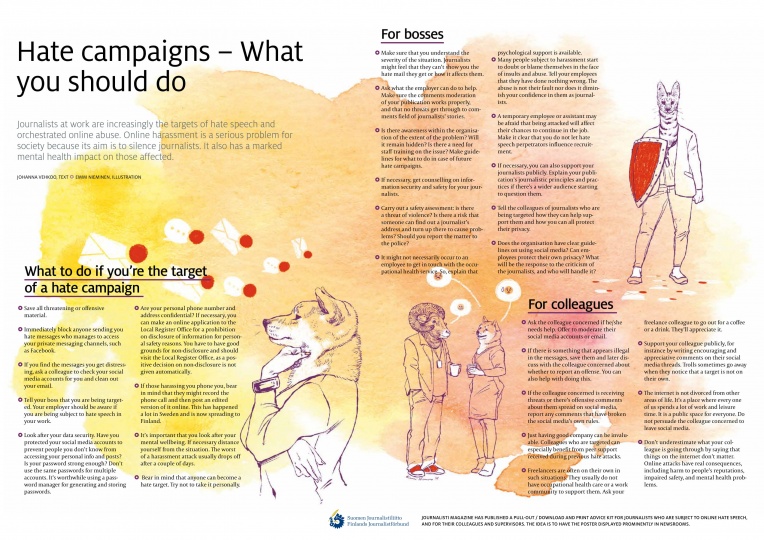Dealing with Hate Campaigns: Toolkit for Journalists
A tip sheet for journalists and newsroom managers on dealing with online hate speech and harassment. Click here for a Spanish version.

Vehkoo and Nieminen are also the authors of The Internet of Hate and Loathing, a book of comics journalism about online misogyny.
WHAT TO DO IF YOU’RE THE TARGET OF A HATE CAMPAIGN
- Save all threatening or offensive material.
- Immediately block anyone sending you hate messages who manages to access your private messaging channels, such as Facebook.
- If you find the messages you get distressing, ask a colleague to check your social media accounts for you and clean out your email.
- Tell your boss that you are being targeted. Your employer should be aware if you are being subject to hate speech in your work.
- Look after your data security. Have you protected your social media accounts to prevent people you don’t know from accessing your personal info and posts? Is your password strong enough? Don’t use the same passwords for multiple accounts. It’s worthwhile using a password manager for generating and storing passwords.
- Are your personal phone number and address confidential? If necessary, you can make an online application to the Local Register Office for a prohibition on disclosure of information for personal safety reasons. You have to have good grounds for non-disclosure and should visit the Local Register Office, as a positive decision on non-disclosure is not given automatically.
- If those harassing you phone you, bear in mind that they might record the phone call and then post an edited version of it online. This has happened a lot in Sweden and is now spreading to Finland.
- It’s important that you look after your mental wellbeing. If necessary distance yourself from the situation. The worst of a harassment attack usually drops off after a couple of days.
- Bear in mind that anyone can become a hate target. Try not to take it personally.
FOR BOSSES
- Make sure that you understand the severity of the situation. Journalists might feel that they can’t show you the hate mail they get or how it affects them.
- Ask what the employer can do to help. Make sure the comments moderation of your publication works properly, and that no threats get through to comments field of journalists’ stories.
- Is there awareness within the organisation of the extent of the problem? Will it remain hidden? Is there a need for staff training on the issue? Make guidelines for what to do in case of future hate campaigns.
- If necessary, get counselling on information security and safety for your journalists.
- Carry out a safety assessment: is there a threat of violence? Is there a risk that someone can find out a journalist’s address and turn up there to cause problems? Should you report the matter to the police?
- It might not necessarily occur to an employee to get in touch with the occupational health service. So, explain that psychological support is available.
- Many people subject to harassment start to doubt or blame themselves in the face of insults and abuse. Tell your employees that they have done nothing wrong. The abuse is not their fault nor does it diminish your confidence in them as journalists.
- A temporary employee or assistant may be afraid that being attacked will affect their chances to continue in the job. Make it clear that you do not let hate speech perpetrators influence recruitment.
- If necessary, you can also support your journalists publicly. Explain your publication’s journalistic principles and practices if there’s a wider audience starting to question them.
- Tell the colleagues of journalists who are being targeted how they can help support them and how you can all protect their privacy.
- Does the organisation have clear guidelines on using social media? Can employees protect their own privacy? What will be the response to the criticism of the journalists, and who will handle it?
FOR COLLEAGUES
- Ask the colleague concerned if he/she needs help. Offer to moderate their social media accounts or email.
- If there is something that appears illegal in the messages, save them and later discuss with the colleague concerned about whether to report an offense. You can also help with doing this.
- If the colleague concerned is receiving threats or there’s offensive comments about them spread on social media, report any comments that have broken the social media’s own rules.
- Just having good company can be invaluable. Colleagues who are targeted can especially benefit from peer support received during previous hate attacks.
- Freelancers are often on their own in such situations. They usually do not have occupational health care or a work community to support them. Ask your freelance colleague to go out for a coffee or a drink. They’ll appreciate it.
- Support your colleague publicly, for instance by writing encouraging and appreciative comments on their social media threads. Trolls sometimes go away when they notice that a target is not on their own.
- The internet is not divorced from other areas of life. It’s a place where every one of us spends a lot of work and leisure time. It is a public space for everyone. Do not persuade the colleague concerned to leave social media.
- Don’t underestimate what your colleague is going through by saying that things on the internet don’t matter. Online attacks have real consequences, including harm to people’s reputations, impaired safety, and mental health problems.
This tip sheet was originally published by The Union of Journalists in Finland.

































































































